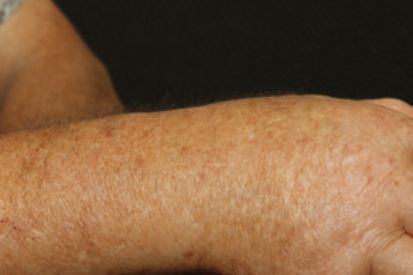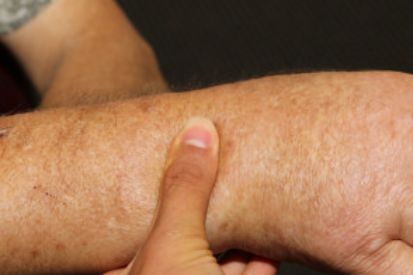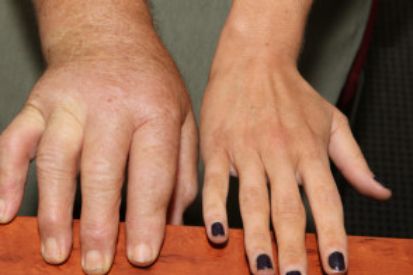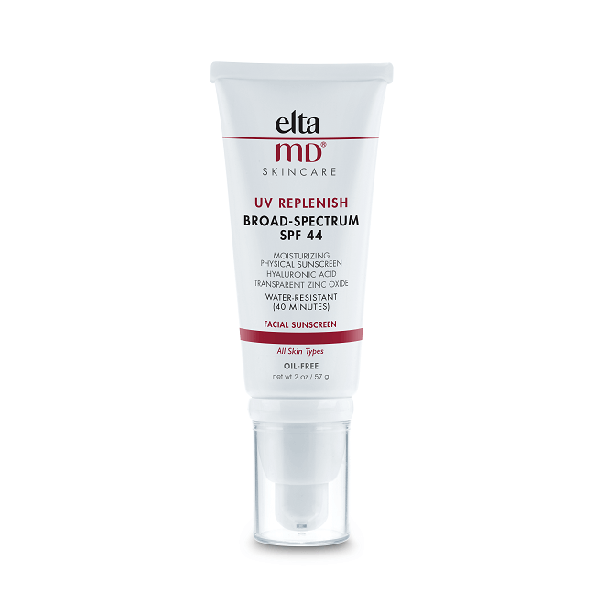Scleroderma
Scleroderma is a rare and chronic autoimmune disorder that causes the hardening and tightening of the skin and connective tissues due to an overproduction of collagen.
Approximately 300,000 people in the United States suffer from scleroderma, which typically affects individuals between the ages of 25 and 55 and gradually worsens over time. Scleroderma is more prevalent in women than men.
At Lupton Dermatology, we understand the complexities of scleroderma, which can impact various parts of the body, leading to skin thickening, joint stiffness, and potential internal organ involvement. Recognizing the importance of early diagnosis and comprehensive management, our trusted providers offer expert care for scleroderma, tailored to address individual symptoms.
If you suspect you have scleroderma or are seeking effective management strategies, schedule an appointment at Lupton Dermatology for a thorough evaluation and personalized treatment plan.
Examples of Scleroderma



What are the Symptoms of Scleroderma?
- Skin hardening.
- Skin that is abnormally dark or light.
- Skin thickening.
- Shiny hands and forearms.
- Small white lumps beneath the skin’s surface.
- Tight facial skin.
- Ulcerations on the fingers or toes.
- Change in color of the fingers and toes from exposure to heat or cold.
- Other symptoms impact bones, muscles, lungs, and the digestive tract.
Causes of Scleroderma
- This chronic connective tissue disease results from an over-production of collagen in the skin and other organs.
- There is no known cause of scleroderma, nor is there a cure.
- Autoimmune Origins: Scleroderma is primarily an autoimmune disorder where the immune system targets healthy tissues.
- Genetic Factors: While not directly hereditary, certain genetic factors may increase susceptibility.
- Environmental Triggers: Exposure to toxins or infections may play a role in triggering scleroderma.
- Collagen Overproduction: Scleroderma involves an abnormal increase in collagen production, leading to tissue hardening.
- Hormonal Influence: More common in women of childbearing age, hormonal changes may contribute to onset or exacerbation.
How to Prevent Scleroderma
- Regular Skin Checks: Early detection of symptoms is crucial. Regular at-home skin checks and Total Body Skin Exams allow for prompt identification and management of any emerging issues.
- Maintaining a Healthy Lifestyle: Embracing a balanced diet rich in fruits, vegetables, and whole grains, coupled with regular exercise, supports overall health. Avoiding tobacco and excessive alcohol consumption is also advisable.
- Sun Protection: Protecting the skin from excessive sun exposure can be beneficial, as some forms of scleroderma affect the skin. This involves using sunscreen, wearing protective clothing, and seeking shade when necessary.
- Prompt Medical Attention: Addressing infections and injuries promptly at one of our offices is essential for individuals with scleroderma, as these events can trigger or worsen symptoms.
Scleroderma FAQs
Early signs may include swelling, tightness, or puffy fingers. As scleroderma progresses, the skin may become thicker, and individuals may notice changes in pigmentation or the appearance of small blood vessels.
Yes, scleroderma can affect specific areas or involve larger portions of the skin. Localized scleroderma tends to affect only certain regions, while systemic scleroderma can impact the entire body, including internal organs.
Diagnosis often involves a combination of clinical examination and diagnostic tests. If you notice skin changes such as thickening or tightening, especially if accompanied by other symptoms, it's advisable to consult a dermatologist promptly.
Yes, scleroderma can affect nails, causing changes such as thickening or loss of cuticles. Hair loss may also occur in some cases. Dermatologists can address these specific concerns and provide guidance on managing related symptoms.
Yes, sun protection is crucial. Scleroderma can make the skin more sensitive to sunlight. Dermatologists often recommend using sunscreen, wearing protective clothing, and avoiding excessive sun exposure.
How to Treat Scleroderma
- Medications: Immunosuppressive drugs, anti-inflammatory medications, and drugs targeting specific symptoms may be prescribed to alleviate symptoms and slow disease progression.
- Physical Therapy: Gentle exercises and physical therapy help maintain joint flexibility, prevent muscle atrophy, and manage pain.
- Skin Care: Dermatological care is crucial in managing skin-related symptoms. Moisturizers, topical steroids, and medications to improve blood flow can help address skin tightness and discomfort.
- Organ-Specific Treatments: Addressing complications involving internal organs requires specialized care. Medications, surgery, or other interventions may be necessary based on the affected organ.
Featured Products for Scleroderma

EltaMD UV Replenish SPF 44
UV Replenish Broad-Spectrum SPF 44 is a 100% physical actives sunscreen that restores moisture to dry, stressed skin. Formulated with chemical-free active ingredients, it provides gentle yet effective sun protection. UV Replenish infuses the skin with hyaluronic acid that helps retain more than 1,000 times its weight in water within skin cells. Antioxidant activity further works to combat skin-aging free radicals associated with ultraviolet (UV) and infrared radiation (IR). It offers high-energy visible (HEV) light protection. This oil-free sunscreen feels weightless on the skin. Ideal for daily and active wear, it may be used by all skin types and after treatments as directed by a skin care professional. 2 oz

iS Clinical Extreme Protect SPF 40
Extreme Protect SPF 40 is a multilevel environmentally protective treatment formula featuring our proprietary Extremozyme® technology combined with scientifically advanced all-physical sunscreen actives; transparent micronized Zinc Oxide and transparent micronized Titanium Dioxide. This antioxidant-rich state-of-the-art broad spectrum UVA/UVB sunscreen helps support optimal skin health as it moisturizes and protects. 100 g e Net wt. 3.5 oz.
